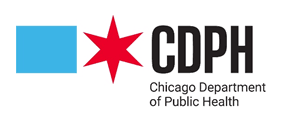Chicago Department of Public Health Weekly Media Brief, 06/26/2025
CDPH Public Information: media.cdph@cityofchicago.org

CDPH Responds to Extreme Heat in Chicago
CDPH reviews the impact of high temperatures on different populations and neighborhoods and analyzes heat-related emergency room visits occurring in the summer months. This report highlights that some population groups and specific zip codes are more highly impacted by heat and humidity than others. This information is valuable for all Chicagoans to prepare for upcoming extreme heat events in Chicago.
CDPH has continued tracking similar data throughout the recent heat advisory alert this past weekend. Early signs indicate that emergency visits were higher among people 65 years and older and residents of the north and northwest sides of the city. Once data collection is complete, additional tips will be shared to help further inform heat preparedness and response efforts this summer.
We encourage residents to learn about the signs of heat-related illness and public health guidance regarding heat preparedness to stay safe during future heat waves. The Department of Public Health has also been working with the Chicago Department of Family and Support Services to develop training for street outreach workers on heat-related illness for people experiencing unsheltered homelessness. Collaboration continues with Northwestern University Buffett Institute to limit the harmful effects of extreme weather events in Chicago, which includes creating a heat vulnerability index with academic and community partners to identify Chicago communities most at risk from extreme heat.
First Illinois West Nile Case of 2025
Illinois Department of Public Health has confirmed the first human case of West Nile virus (WNV) in Illinois in 2025.
Chicago Department of Public Health has a robust program to prevent and control WNV, which includes treating over 80,000 catch basins with larvicide to prevent adult mosquitoes, collecting and testing mosquitoes every week for WNV, spraying to kill adult mosquitoes in specific areas if indicated, and monitoring human WNV infections.
The best way to prevent WNV is for Chicagoans to protect themselves from mosquito bites by:
- Using EPA-registered insect repellent according to label instructions, especially when applying to children.
- Wearing long-sleeved shirts and pants when outside between dusk and dawn.
- Controlling mosquitoes indoors by making sure that window and door screens do not have holes and by using air conditioning if possible.
- Controlling mosquitoes outdoors by keeping grass and weeds short to eliminate hiding places for mosquitoes and emptying items that hold water like flowerpots or birdbaths once weekly.
- Checking on neighbors regularly, especially those who are older, live alone or need additional assistance.
End of Health Benefits for Immigrant Adults
Health Benefits for Immigrant Adults (HBIA), which provides Medicaid-like coverage to eligible individuals aged 42-64, will end, effective July 1, 2025. CDPH is working closely with State, City, and community partners, to help impacted residents access the services and support they need, including:
- Mental Health resources: The City of Chicago Mental Health Clinics are open to all residents regardless of immigration or insurance status. Clinics offer both in-person and teletherapy services across 7 city locations. Locate a clinic: chicago.gov/MentalHealthClinics
- Metro Chicago at 2-1-1: Residents can call 2-1-1 or text their zip code to 898-211, to get connected to a Resource Navigator for health and social services.
- Free & Low-Cost Clinics: Uninsured and underinsured Chicagoans can continue to receive care at health centers and free clinics that serve all individuals regardless of immigration status or ability to pay.
- ICIRR Family Support Hotline: Residents can call the Illinois Coalition for Immigrant and Refugee Rights (ICIRR) Family Support Hotline at 855-435-7693 for help navigating available resources.
- ACA Marketplace: Individuals who now have documented noncitizen status may be eligible for coverage through the Affordable Care Act (ACA) Health Insurance Marketplace at getcovered.illinois.gov.
Alert Threshold Crossed for Opioid Overdoses
On Saturday, June 21, there was a spike in opioid overdoses in Chicago. CDPH's Office of Substance Use noted 37 opioid-overdose related EMS responses on a single day. In a recently issued HAN Alert , CDPH has urged partner organizations and emergency responders to stay alert in the wake of warmer temperatures, call 911 and administer naloxone or Narcan to individuals who may be overdosing, and consider immediate initiation of medications for opioid use disorder for patients whose overdoses were reversed before discharge from the ED or hospital. MAR NOW is Illinois' immediate opioid treatment helpline and can be accessed by calling 833-234-6343 or texting "HELP" to 833234.
Dr. Green Bringing LGBT Care to South Shore
CDPH extends our congratulations to Dr. Maya Green, MD, MPH, on the opening of her newest health clinic, Onyx Medical Wellness, in the South Shore community.
A proud South Sider and a champion of health equity, Dr. Green continues to exemplify what it means to "meet people where they are."
Onyx Medical Wellness, located at 2247 E. 73rd Street, opened its doors on June 19 and is focused on providing accessible, affirming care to the LGBTQ community. Dr. Green has partnered with CDPH on several key initiatives, including the PrEPNow Chicago campaign to raise awareness about HIV prevention, and she's been a featured voice on CDPH's Healthy Chicago podcast and in public health videos for National Women and Girls HIV/AIDS Awareness Day.
Learn more about Dr. Green's HIV prevention work with CDPH at the Prep Now Chicago webpage.
Wellness on Wheels
Wellness on Wheels (WOW) is a by-request mobile health unit from Illinois Department of Public Health equipped to provide immunizations, health screenings, HIV and STD testing, and other essential services.
Whether you're hosting a community fair, health event, or neighborhood outreach, WOW helps bring care to where it's needed most.
Please submit requests at least 4-8 weeks before event date. Request a unit through this form: https://lnkd.in/gbTaQ4up
Questions? Email dph.cmhs.info@illinois.gov.
###




